Z-93 in 1979
... the Z arrives! |
|
By late 1979, Beautiful Music WSRA found itself constrained by the
direct format competitors it had attracted; there were 5 soft music
stations in the market. Rates had been stagnant for a year and there
appeared to be other opportunities with greater revenue potential.
A competitor, WPRM "Salsoul 98" had gotten into the top 5 with a
salsa, disco and pop format and I thought that we could eliminate
the disco and pop and have a winning station with higher numbers
than WSRA had, which was a 4 share. |
|
      |
|
We could have been wrong... |
A research project consisting of intercepts and focus groups
done by a local company was inconclusive as
to the viability of an all-salsa FM. A broad
sample of respondents thought such a format would be too monotonous.
The recommendation of the research company
was to play a broad range of music.
Finally, several of us spent some time doing
our own "study" of record sales by watching
what people bought at several record stores
and then giving a gift if those who bought
salsa or merengue answered a few questions.
That little informal project
showed that salsa buyers seldom crossed genres and truly detested
hearing anything else on a station that
programmed salsa. The project was
launched more on intuition than intelligence.
And we learned that research was useless
unless the right people were interviewed.
And we saw confirmation in real behavior of
our concept, while asking "what if"
questions of consumers generally yields
wrong answers. |
|
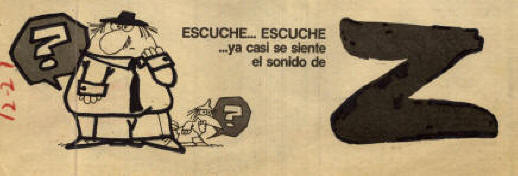 |
Extensive
advertising was done prior to the station's launch as WZNT on
December 29, 1978.
The above ad ran both on bus cards and in print
ahead of the launch and said,
"Listen... listen... you can almost
hear the sound of the Z" |
|
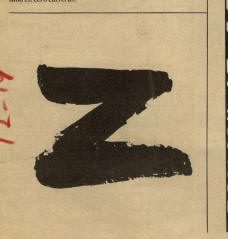 |
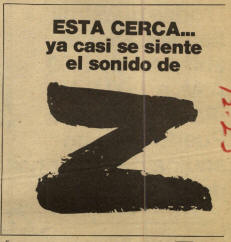 |
|
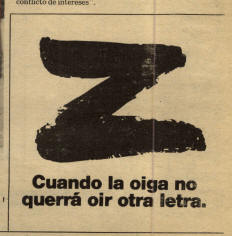 |
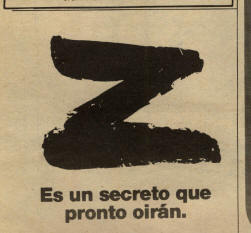 |
And even before that, a teaser
campaign could be "zeen" in the various
San Juan newspapers. |
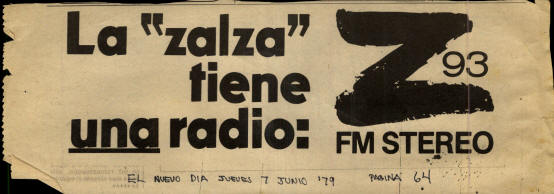 |
|
A day before
the weekend of the launch, the final few days of 1978, I called the
GSM's of the San Juan TV stations and offered to pay 20% of card for
all the unsold inventory that weekend. We ended up with over 1000
GRPs for a small, small investment... and the GSM's got some extra dollars
at year-end! |
|
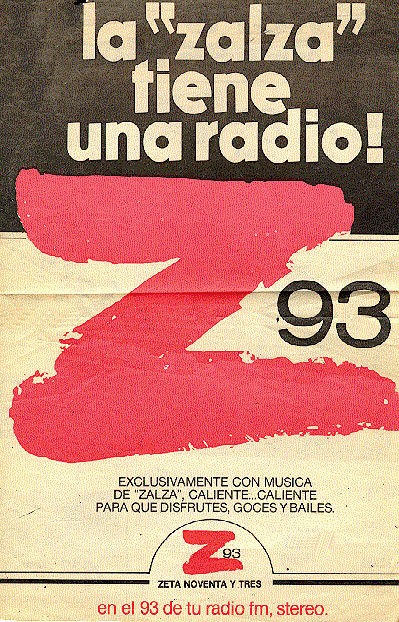 |
|
Launch day was
officially Saturday morning, December 30, 1978. The launch was made
over the New Year's weekend, when interest in salsa at parties and
dances was at its peak. This ad ran in the papers on that day.
|
|
    |
|
That first
weekend of broadcasting was heralded by full
page print adds and over a thousand GRPs of
TV... the only TV ever used. The TV spot
featured flashes of the best salsa singers
and the station logo with an invitation to
listen to the world's first all salsa
station at 93.7 FM. |
|
Salsa has its own station... |
|
The new
station logo was an attempt to capitalize on
the single-letter IDs sweeping the US, but
with a Spanish flavor. The original design
was done with a paintbrush on a piece of
wallboard, and then taken to the station's
ad agency for "refinement." |
|
The Masked
Salsa Man (El Zalzero Enmascarado) |
|
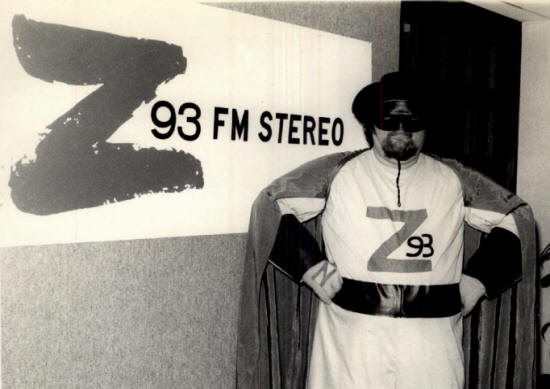 |
|
In the station lobby with
a bus card on the wall. |
|
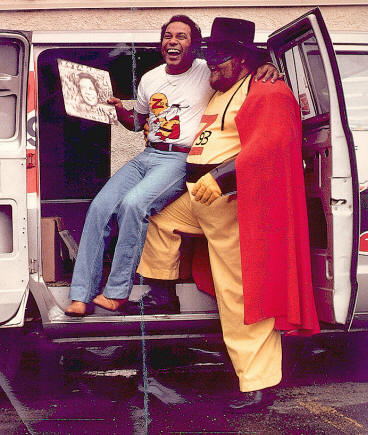 |
|
The "Zalzero
Enmascarado" was both an ad gimmick as well as a real person. Here,
Pedro Arroyo, the Zalzero, holds singer Cheo Feliciano in a "street
rip" that was a daily occurrence at Z-93. The promotion person who
became the official Zalzero stayed with the station and eventually
became the very successful program director, and he has maintained the station in
the top 5 for several decades. Congratulations to Pedro Arroyo for
preserving the legacy of Z-93 and for
keeping the salsa art form alive with
excellent promotions such as the Día
Nacional de la Salsa. |
|
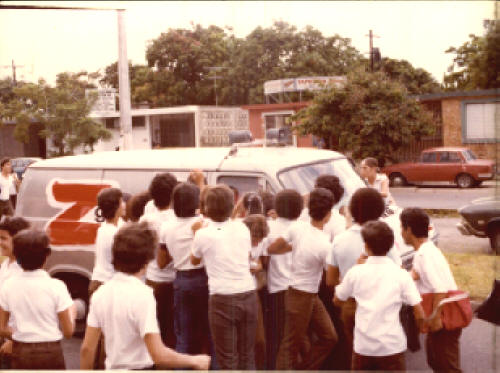 |
|
Van hits were
definitely popular. Unfortunately, this van was destroyed in an
appearance when it was rolled and looted! We learned to park against
walls after that. |
|
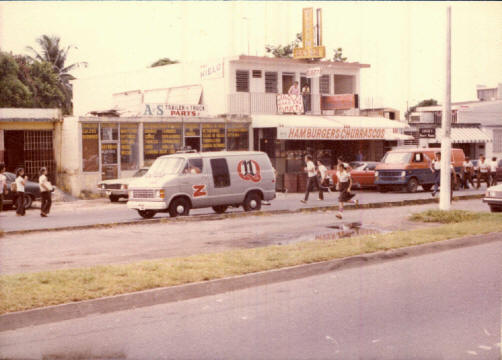 |
|
Over 1
million stickers! |
|
The
ubiquitous Z window sticker showed up all over the Island.
Originally a sales promotion with Burger King, we knew something was
going right when the first 100 thousand were gone in 72 hours. By
the end of the contest, 1,375,000 stickers had been provided by
Byron Crecelious at US Tape & Label. |
|
Cami-Zetas |
|
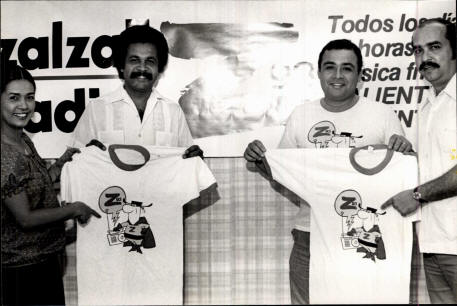 |
|
Office
manager Wilma Mendoza,Production Manager Saúl Maldonado and mid-day
jock Victor Manuel join PD Richard Santiago (now News Director of
KLVE-Los Angeles) in inspecting the first Z-93 "Camizetas". Z-93
gave away over 20,000 Z-shirts in its first year. So popular were
the shirts that retail versions were designed and sold to clothing
retailers. The profit from the retail shirts paid for all the ones
given as prizes! |
|
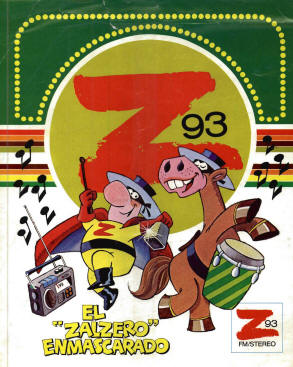 |
|
Another
example of the use of the ""Masked Salsa Man" were these posters put
in the Puerto Rico TV Guide publication. Above is the top of a
pull-out calendar for 1980 which WZNT published. Note that there are
9 "Z" letters in the poster (even the radio dial has one) |
|
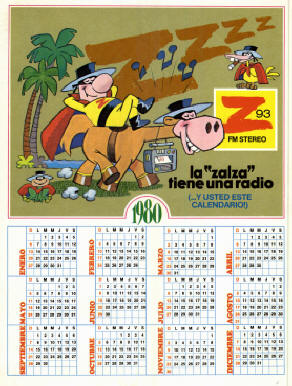 |
|
A calendar with the Zalzero was
featured in Vea's year-end issue in 1979. |
|
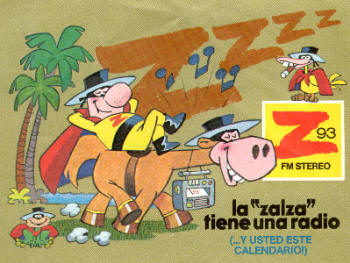 |
|
New posters were regularly inserted
in the magazine. Similarly, we issued new T-shirt designs nearly
every month for our retail distributors. Many listeners collected
them. |
|
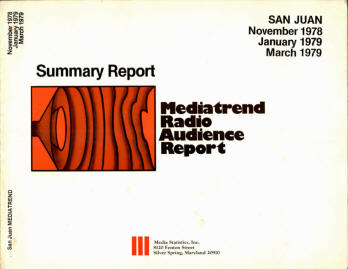 |
|
The Ratings Arrive. |
|
San Juan was a Mediastat market; the
first survey came 22 days after Z-93 debuted. And what a debut! 22.5
was the share after three weeks of operation. Two months later, a
33.5 was achieved. It was the highest rated top-50 market FM in the
USA. |
|
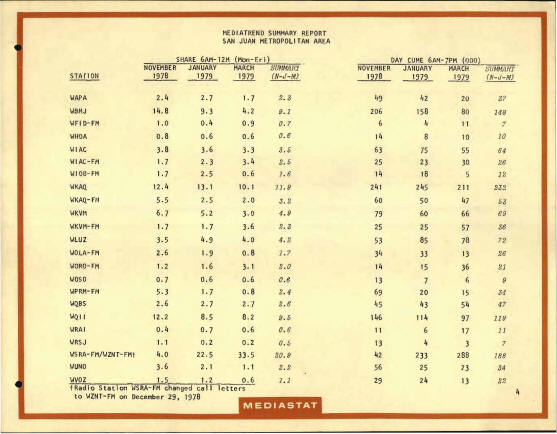 |
|
In January and March, our next
closest competitor had a 10 share in the full Mediastat table for
Nov-Jan-Mar 1978-1979. All FM stations had a total of 18 shares
before WZNT went on the air. Within a year, the combined FM shares
were nearly 50% .Click on the table above to see the entire
Mediatrend book for San Juan.
|
|
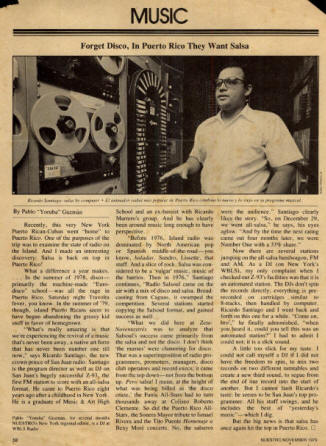 |
|
"Nuestro," a magazine catering to
U.S. Latinos, featured the WZNT success story. Click on
article for a readable
PDF version. |
|
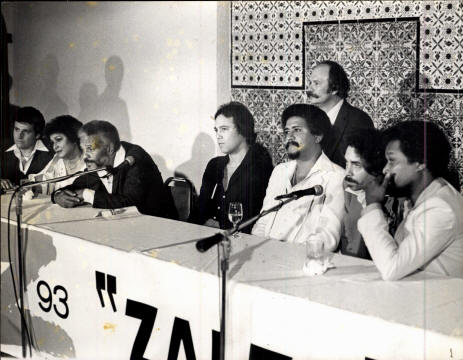 |
|
El Concierto Mayor |
|
Z-93
presented many concerts. The first, honoring
Ismael Rivera, "El Sonero Mayor"
presented the best salsa singers in honor of
the acknowledged king of salsa song. Left to
right are Ismael Miranda, Lucecita Benítez,
Rivera and Ruben Blades. This concert, in
Z's 4th month on the air, broke a gate and
attendance record for the venue.
At the event, the Willy Colón orchestra
played for Ismael Rivera, Celia Cruz, Justo
Betancourt, Luigi Texidor, Rubén Blades,
Ismael Miranda and Héctor Lavoe.
Concerts represented a large part of
first-year revenues. At a later Fania All
Stars concert presented by the station, I
was made an honorary member of the All Stars
for my contributions to the music and the
artists. |
|
Rates |
|
With
considerable fear, we had waited until the end of December of 1978
to change format so as not to lose the revenues from the old easy
listening programming. And we kept the $33 thousand in December
revenues, fully expecting to not bill a thing in January. Surprise:
walk in business produced $57 thousand in gross billings in January.
Five rate increases in the first year resulted in average monthly
billings of over $150 thousand by the end of 1979... the highest
billings in the market. Rates went from $16 for 30" spots to over
$100. |
|
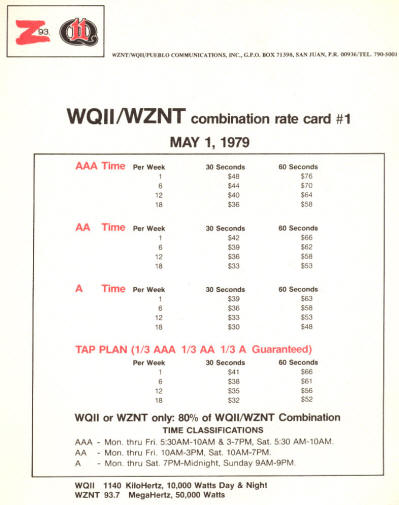 |
The mid-1979 rate card showed the
station had nearly tripled its
pre-format rates in just 6
months. |
|
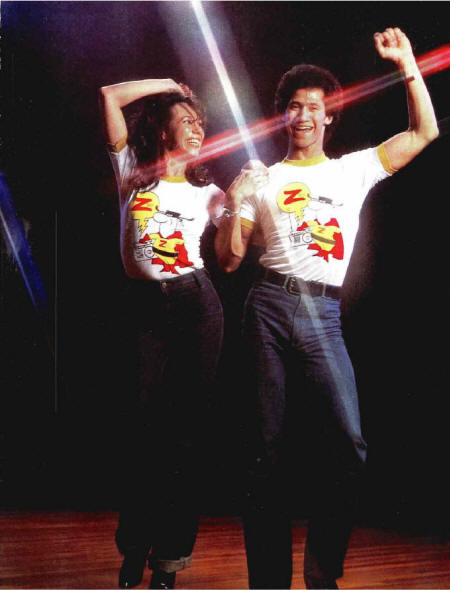 |
The Pueblo
International annual report to shareholders featured the
success of
WZNT with this picture of Z-fans dancing salsa!
Click on the picture for a PDF
of the Annual Report |
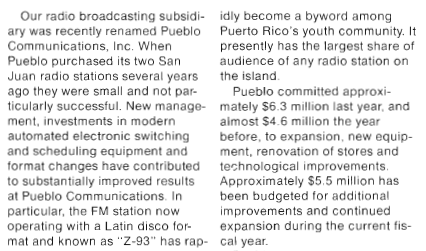 |
And here is what Pueblo Chairman
Harold Toppel said about the
stations in the 1979 annual report to
shareholders. |
|
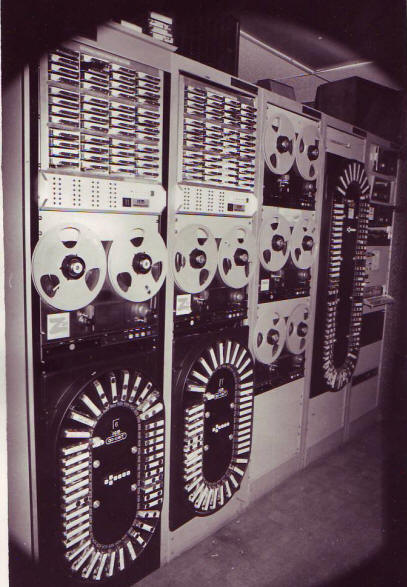 |
|
Number 1, and totally automated! The
station was entirely voice tracked, with the DJs prerecording nearly
everything so they could get out on the street for promotions.
|
|
Epilogue |
|
Z-93 continued to be the #1 station
in Puerto Rico until 1985, when they were unseated by Salsoul 98.
That story is on another page of this resume.
But 30 years later, Z-93 is still among the top 5 stations in Puerto
Rico and the concept of being Puerto Rico's salsa station continues. |